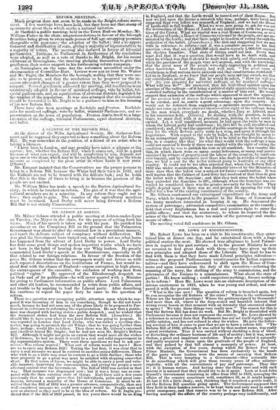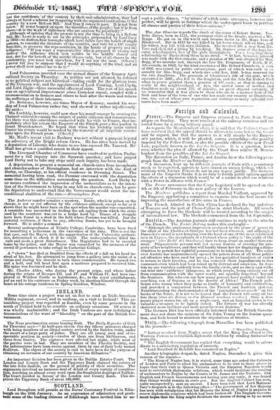MR. LOWE AT KIDDERMINSTER.
Mr. Robert Lowe has been on a visit to his constituents; they enter- tained him at dinner one day, and he entertained them with a huge political oration the next. Ire showed true allegifuice to Lord Palmer- ston in regard to his past services. As to the present, Ministry he sees no occasion to find great fault with them—they have given up their own principles and adopted those of the Liberals. The fault he has to find with them is that they have made Liberal principles ridiculous— witness the proposed Parliamentary constituencies for Indian represen- tatives—and they have endeavoured to shift upon the House of Com- mons and upon commissions the duty of the executive—referring the manning of the navy, the clothing of the army to commissions, and the grievances of the Ionians to a commissioner. What about the state of parties ? He knew nothing could conjecture nothing; foresee nothing. As to reform ? Here Mr. Lowe went into an elaborate description of the intense excitement in 1832, when he was young and ardent, and com- pared it with the present time. Mr. Robert Lowe has been on a visit to his constituents; they enter- tained him at dinner one day, and he entertained them with a huge political oration the next. Ire showed true allegifuice to Lord Palmer- ston in regard to his past services. As to the present, Ministry he sees no occasion to find great fault with them—they have given up their own principles and adopted those of the Liberals. The fault he has to find with them is that they have made Liberal principles ridiculous— witness the proposed Parliamentary constituencies for Indian represen- tatives—and they have endeavoured to shift upon the House of Com- mons and upon commissions the duty of the executive—referring the manning of the navy, the clothing of the army to commissions, and the grievances of the Ionians to a commissioner. What about the state of parties ? He knew nothing could conjecture nothing; foresee nothing. As to reform ? Here Mr. Lowe went into an elaborate description of the intense excitement in 1832, when he was young and ardent, and com- pared it with the present time. " What is the case now? The question of reform is broached again, but do you recognize the old features of the crisis? When is the enthusiasm ? Where are the boasted meetings ? Where the petitions signed by thousands ? And more than all, where is the deep-seated and heartfelt interest that wrung every bosom at that moment with an intensity that amounted almost to agony ? We take these things very coolly now." The reason for this is that the Reform Bill has done its work. But Mr. Bright is dissatisfied with Parliament because it does not represent the country. Mr. Lowe showed by a reference to several facts that Parliament has not set itself rigidly against public opinion, and has not refused to obey its wishes. He gave the follow- ing account of how it came to pass that we are to have a reform bill. "The Reform Bill of 1832, although it was called by that modest name, was really a great revolution. True it was carried without shedding a drop of blood, or disturbing the ordinary business of life and of society ; but it was, never- theless a great and important revolution. Those who carried it naturally and justly acquired a claim upon the gratitude of the people of England, and they gained by that bill almost a monopoly of power. At least, with the exception of five years, during which Sir Robert Peel was Prime Minister, the Government has been exclusively in the hands of the party. whose leaders were the means of carrying that Reform Bill. This ni very tempting to a Government—they naturally like to do something which will give them twenty years of office uninter- ruptedly. with all the concomitants of pay and patronage. They like it ; it is human nature. And having done the thing once and with such success it is natural that they should try to do it again. Look at Lord John Russell's Government remaining in office from 1847 to 18.52, managing the affairs of the country sometimes well, sometimes ill, as it might happen. At last it felt a little shaky, and, thinking that it required a gentle tonic, it set the Reform Bill question going again. The Government supposed that they held in their hands a reserve, to be kept back and only used in cases of great emergency, and that reserve was to be a new Reform Bill. After having managed the affairs of the country perhaps very indifferently, and lost the-,petifidenWe leflithk'etiantry Medi' aMl-trdlninistratio sr§ 'Ltd s'bf thd•
always tit kind' a'ièfor Iiiropering with-the organized instifu below. It is not'hdactielFiiiiiipon ers Of the people ';',b
eounirtly,a tie* orfir13111:• And 'thi.,t4 Conies to pass. '
above-4 is the *ork of itafesmen who ire anxious -popul '
Although of opinion that the present is 'not"the tuito bring n Reform gill,:/kri'Lowe is ready le act on the prineiples p Minded hy Lord Grey, itelglit21,44'dillfranehisd'fiortni[,-lis 'which have fallen intOil'elitititis of single patrrms, torantodid the diVisions of the counties,anclike for 'a 10t. county frariclxise, to 'Strictly the representation in thel(in-delrptioperty and in- telligence. "If yon want it repteientativet wiOj Prbitated to swamp and dearer the iitthieertee which-T,titi* resides in the -middle classes and that, .trot for the hetiefit of the.nilddle classes only, but 'of all classes in the community, youttinst look ;elsewhere, for I am not ihe'lnint'."' '(Chrers.) I never led you to suppose' that I would do anything of the kind, and no power shall ever induce me to do it."
Lord Pahnerstowpresided over tfa'rfttnuttl dinner Of the Romsey Agri- cultural Society- On nuPday. As 'PtifitiO are not allowed, he referred to noolitical subject not historical—taking credit for the glorious issue eftle Crimean war, and the appointment of Lord Canning, Lord Clyde, apd Lord Elgin—three successful oflietrs of state. The rest of his speepl}, was on agricultural improvement since. Corn-law repeal, coupled witlt a. recommendation to farmers and others to look after the wants and relieve. the:sufferings of their labourers. .
'Hr. Beddeme, however, six times Mayor of Romsey, carried his wer- ship,of Lord Palmerstrin Tether far;' and 'showed' it rather injudiciously.
He said— • • , • . • 'His Lordship, however, could now show his moral courage by crossing the Channel without becoming the subjeet of public criticism and remonstrance. Yet there was this coincidence cannected with his visit to France, that im- thediately after his return the Emperor of the French gave a free pardon to Count Itfontalembert. He hoped that when his lordship again visited ROO his return Would be marked by the removal of all impolitie restric- tiOnSUP'on the French press. (Cheers.)
b recent visit to Banbury was not without a purpose beyond tb'eAvocaey of the Bright reform views. Ile has since been moved by. ti,depntation of Liberals who desire to sew hiin succeed Mr. Tunered. Mr *en has given a qualified assent to their appeal.
-.TheLiverpool,Chamber of Commerce have-resolted to petition Parlia- ment for a full inquiry into the Sarawak tpiestion ; and have prayed Lord Derby not to take any steps until such irtriniry has been made. :A deputation, te,present a menileriiil,nn; Am-di-rates from incumbents and churchwardens of, Birmiagliam, had an interview with the Earl of Derby on,Thursday, at his official residence in .Downing Street. The memorial.having been read, the.Pnamier cenversed with • the deputation sonsietime on the difficulties surrounding the question. Lord Derby by no means confirmed the impression of the memorialists as to the inten- tion-of the Government to bring in any bill on church-rates, but he gave the deputation to understand that the Government would resist the un- conditional abolition of the rate.—Birmineham Post.
The Andover murder remains a mystery. Banks, whole in prison on the charge, is not as yet affected by the evidence adduced, except so far as it shows that he might have been on the spot when the murder was committed. A Constable has succeeded in finding the ash sapling from which the stake used by the murderer was cut in a hedge hard by. Traces of a struggle have been found in a shed in the field where Parsons was killed. But the material evidence, if there be any, affecting Banks, has yet to be brought forward. He is under a remand.• •
Several undergraduates of Trinity College, Cambridge, have been fined for assaulting a policeman in the execution of his duty. This is not the first case, and the Mayor, with the appprobatMn of the 'University authori- ties, determined to check it if he could. The undergraduates filled the ourt and made a great disturbance. The Magistrates had to be escorted honie by the police, and the Mayor was compelled by the menaces of the crowd of goWnsmen to take refuge in Catherine College.
A "clown" has died at Bradford from the effects of a fall on his head in- stead of his feet. Ile attempted to jump from a gallery into the midst of a circus and during his descent to turn three summersaults. He turned two and a half, and fell head first upon a mattress prepared to received him. His spine was fractured and he died.
Mt. Charles Alder, who during the present reign, and whose father during the reigns of Georges III. and IV. and William IV. had been em- ployed at Windsor Castle as 'hairdresser, &c., to the royal establishment, put an end to his existence on Friday week, by shooting himself through the heart at his cottage residence in Spring Gardena, Windsor.



























 Previous page
Previous page